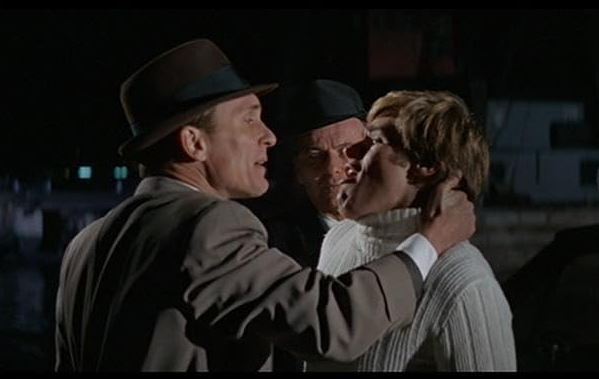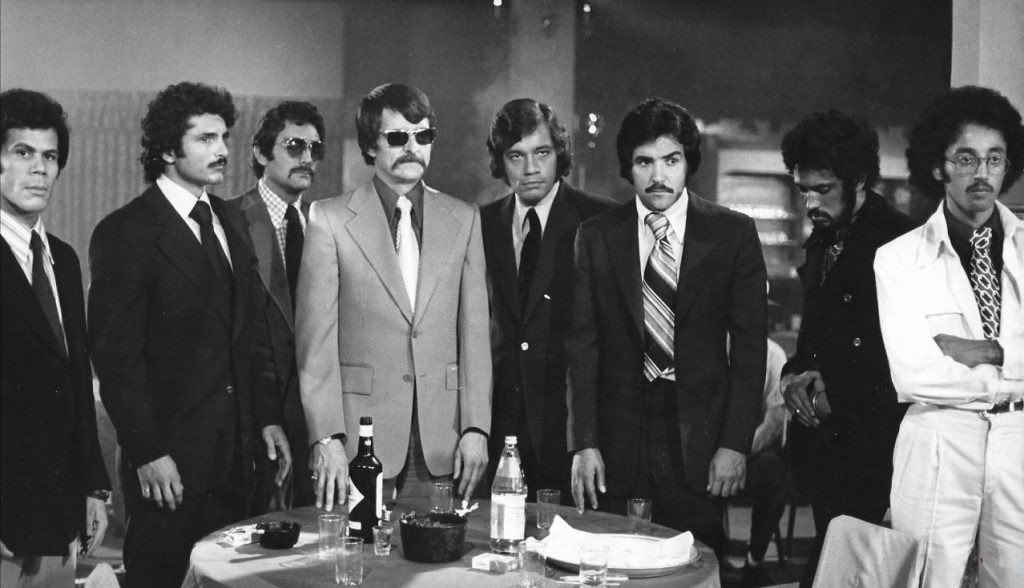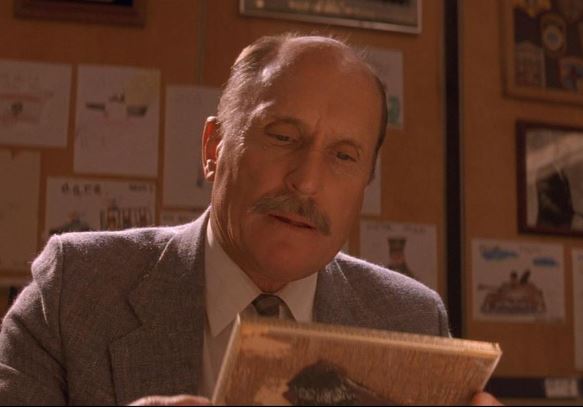
Cops: The Rain People (1969), Badge 373 (1973), True Confessions (1981), Colors (1988) & Falling Down (1993)
Duvall has played a lot of law enforcement officers, kicking things off with a homophobic head-buster in The Detective before popping up as an obnoxious, daughter-abusing motorcycle cop in the vaguely feminist Rain People. He’s introduced with half an hour to go to give Coppola’s underwhelming early effort a much-needed kick in the pants, but his role doesn’t ring true. Part of the problem is he hands out a speeding ticket to the flick’s heroine, believing this to be the perfect platform upon which to ask her out. They end up dating. Huh? If a cop gave you a ticket, would you then get romantically involved? In other words, the plausibility is off, a fault that’s quickly followed by a bout of melodrama. Oh well, at least you get to see him teamed with James Caan for the first time.
In Badge 373, a miscast Duvall follows in Gene Hackman’s footsteps by playing the legendary real-life cop that inspired The French Connection. Hackman always convinced as a mean bastard, but the tubby, chain-smoking Duvall struggles as racist NYC detective Eddie Ryan, trying to convey his street smarts and no-shit attitude by being rude and shouty. Hence, everyone is a ‘spick’, ‘spade’ or ‘little Jew prick’. There’s not much charm or wit on display, that’s for sure. The only humor I found was Duvall impersonating a Puerto Rican (complete with oily black wig and droopy tash) while describing a rectum as a ‘chocolate-covered speedway’.

Saying that, I didn’t mind the first forty-five minutes of Badge with its good location work and grimy feel, but things grow increasingly strained when the suit and tie-wearing Ryan is surrounded by about ten baseball bat-wielding Puerto Rican toughs, prompting him to barge them out of the way, outrun them, commandeer a bus and lead them on a wild, night-time chase. Good grief, it’s a ludicrous sequence.
Meanwhile, Ryan’s missus complains that he spends more time playing with his gun than he does with her. When she asks him to say he loves her, he replies: “I don’t know what those words mean.” Ryan, you see, is one helluva Tough Cop, the sort that would gnaw his own leg off to nail a perp. It doesn’t even matter that he spends almost the entire movie without his badge after inadvertently helping a frilly-shirted Puerto Rican fall to his death from a rooftop. Not long after his partner ends up dead and he has to find out the truth. The overlong Badge died at the box office and got a big thumbs down from the critics, but its abundance of non-PC elements, oft-poor dialogue, mismatched score and ropey performances nudge it into amusingly bonkers territory.

Duvall did his best work in the seventies, making sterling contributions to the bonafide classics Network, Apocalypse and the two Godfathers. During the eighties his output slowed and the quality dropped. Many of his films like Belizaire the Cajun and Hotel Colonial I doubt you’ve even heard of. I know I haven’t. The disappointing nature of his offerings was typified by the decade’s first, the poorly written, 1940s-set True Confessions.
Boy, this one never gets out of second gear, despite Duvall being teamed with a prime De Niro in his Raging Bull follow-up as a monsignor. Director Ulu Grosbard proves more interested in capturing the intricacies of Roman Catholic rituals than generating some desperately needed action. His approach is typified by its dreary bookending, two pointless modern-day sequences in which De Niro and Duvall gab about nothing relevant whatsoever. There’s just so little meat for viewers to get their teeth into.
A subdued Duvall is a hardworking detective in charge of the ‘Virgin Tramp’ case in which a young Catholic woman has been found naked and cut in half with a ‘candle stuck up her joy trail’. Duvall raises his voice about five times, punches a bloke in the gut, kicks a filing cabinet and gets into a public scuffle. That’s pretty much all the excitement on offer. Badge 373 was a turkey but at least Duvall got to regularly spit out abuse and bang heads. Can’t fault the acting too much (with De Niro winning ‘the who can pause the longest’ competition) but Confessions is way too murky. Indeed, De Niro’s half of the story is particularly half-baked. This handsome neo-noir crime flick might feature hookers, murder, porn, rampant hypocrisy and corruption but it’s too timid to get dirt under its fingernails. The goddamn thing feels varnished.

The all right, thinly plotted Colors is a better watch, despite a terrible 80s score and a cringeworthy coda. Its two hours are also a lot more significant in that it helped usher in an avalanche of similarly themed gang movies during the 1990s. If you like the first ten minutes, you’ll probably be fine with the rest, but the writing’s not good enough to distinguish it. Duvall’s a seasoned cop, tasked with the none-too-small problem of dealing with gang rivalry on the mean streets of East L.A. Early on we’re told there are 250 police officers trying to control nearly 70,000 gangbangers with almost 400 annual killings. To make matters worse Duvall gets paired with the ‘all adrenaline’ Sean Penn, a cocky, aggressive fuck that thinks of himself as Rocky 6. “I used to get jacked up because I thought I needed that edge,” Duvall tells Penn after his latest burst of perp-abusing behavior. “What I remember most from that time is nothing but regrets.” It’s a non-showy role allowing Duvall to put in a workmanlike shift, but he’s let down by the rather unconvincing gang members on display.
Director Dennis Hopper has a fair crack at covering the bases of this societal scourge, showing everything from the mute witnesses and crappy role models to machismo and community anger. He offers no solutions, preferring to paint a portrait of cyclical violence in which the differing methods of Duvall and Penn are equally ineffective. Meanwhile, the fatalistic gangbangers, who believe there will always be gangs and street violence, just go on wiping each other out in drive-bys. Or as one says without a shred of self-awareness: “That’s just life.”

Falling Down is a fave, even if Duvall very much plays second fiddle to an electric Michael Douglas. Saddled with a clichéd role of a cop on his last day (so we know straight away he’s either gonna bust open a juicy case or get killed trying), the Arizona-bound Duvall helps give this controversial crime drama its heart. He used to be a decent detective, but a wounding, the loss of a child and a neurotic wife too afraid to let him further mix with the bad boys out on the street has reduced him to a ‘desk jockey’. He’s now an avuncular office presence, although you can tell he’s pained by the way his colleagues patronize or ignore him. Indeed, a sense of emasculation and waste hangs over this decent, thoughtful cop, but he’s the one that starts putting the pieces together about Douglas’ blackly comic, golf-interrupting rampage across Los Angeles.
However, his progress isn’t helped by a prick of a boss, who tells him: “I’ve never liked you. You wanna know why? You don’t curse. I don’t trust a man who doesn’t curse. Not a ‘fuck’ or a ‘shit’ in all these years. Real men curse and I especially don’t like a man in my command who’s afraid to hit the streets. It’s bad for morale. Get back behind that desk where you belong and don’t waste any more of my time pretending, you’re a cop.”
Duvall is mostly very good here, soaking up the insults while using his subtle mannerisms, sharp brain and sense of empathy to build a downtrodden character that’s still got something in the tank. Mind you, the way he eventually stands up for himself against all and sundry and wins the day does border on fantasy. Still, this is American cinema and as the slovenly black cop at the end of Die Hard also showed, nothing is more reinvigorating than shooting dead another man.
For Duvall Part 6, Click Here
Leave a Reply